[lang_fr]
– Meilleurs joueurs d’hier
– Champions du monde
[/lang_fr]
[lang_en]
– Top players from the past
– World champions
[/lang_en]
[lang_fr]
| Mikhaïl Tal | |
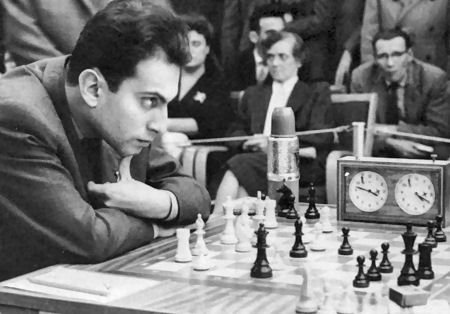 |
|
| Naissance | 9 novembre 1936 Riga, RSS de Lettonie |
|---|---|
| Décès | 28 juin 1992 (à 55 ans) Moscou, Russie |
| Nationalité | |
| Profession(s) | Joueur d’échecs |
| Distinctions | Champion du monde d’échecs |
Mikhaïl Nekhemievitch Tal, né le 9 novembre 1936 à Riga (Lettonie) et mort le 28 juin 1992 à Moscou (Russie), est un joueur d’échecs letton, devenu soviétique comme la Lettonie en 1944. Il a été champion du monde d’échecs en 1960, et six fois Champion d’URSS (en 1957, 1958, 1967, 1972, 1974 et 1978).
Champion d’URSS à vingt ans, en 1957, il conserva son titre l’année suivante et se qualifia pour le tournoi interzonal de 1958 qu’il remporta ainsi que le tournoi des candidats de 1959, obtenant le droit d’affronter le champion du monde Mikhaïl Botvinnik. Tal vainquit Botvinnik, en 1960, devenant, à 23 ans, le plus jeune champion du monde jusqu’en 1985. En 1961, lors du match revanche contre Botvinnik, il perdit son titre. De 1956 à 1991, Tal a disputé neuf tournois interzonaux et a participé à six cycles des candidats (1959, 1962, 1965, 1968, 1980 et 1985), mais ne réussit plus, après 1961, à se qualifier pour la finale du championnat du monde d’échecs.
Surnommé « le magicien de Riga », Tal préférait nettement le jeu tactique au jeu positionnel, et ne reculait devant aucun sacrifice, même le plus risqué. Fumeur et buveur invétéré, il a disputé des compétitions jusqu’à la fin de sa vie, malgré de fréquentes maladies contractées dès 1961. Acharné, il lui arrivait de disputer des parties de blitz dans sa chambre d’hôpital, il alla même jusqu’à jouer des parties de compétition alité dans sa chambre d’hôtel.

Tal détient deux des plus longues séries d’invincibilité : entre le 15 juillet 1972 et le 26 avril 1973, il joua 86 parties dans diverses compétitions sans perdre : +47 -0 =39. Peu après, d’octobre 1973 à octobre 1974, il fut invaincu pendant 93 parties (+45 =48).
Un tournoi mémorial Tal est organisé chaque année à Moscou depuis 2006.

Biographie et carrière
Années de formation
Né en Lettonie indépendante à Riga, en novembre 1936, deux mois avant Boris Spassky, il devint Soviétique après l’annexion de son pays, en 1944. Sa famille, juive, dut quitter Riga avant l’arrivée des troupes allemandes en 1941.
Il apprit à jouer durant la guerre et fut rapidement remarqué pour ses aptitudes. En 1949 débuta une longue collaboration avec Alexandre Koblentz, qui resta son entraîneur durant toute sa carrière.
Dans les années 1950, il orienta ses études vers la langue et la littérature russes, mais ce furent finalement les échecs qu’il choisit pour profession.
Champion de Lettonie (1953)
Tal participa pour la première fois au championnat de Lettonie adultes en 1951, il termina 11e-14e en marquant 9 points sur 19. L’année suivante, en 1952, il finit 7e, avec 10 points sur 17. En 1953, il remporta le titre de champion avec 14,5 points sur 19. Cependant en 1955, il ne fut que deuxième (14 / 19) et, en 1958, après avoir remporté deux titres de champion d’URSS, il termina seulement troisième avec 16,5 points sur 19. Après la victoire au championnat du monde, Tal ne revint au championnat de Lettonie qu’en 1965 : il remporta un deuxième titre avec 11 points sur 14 (+8 =6).
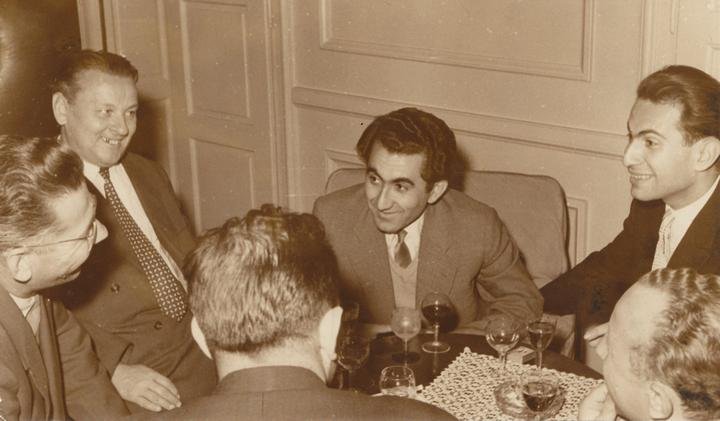
La conquête du championnat du monde (1957–1961)
Champion d’URSS 1957 et 1958
En 1955, Tal termina 3e-4e du tournoi zonal balte, disputé à Vilnius, qui faisait office de quart de finale du championnat d’URSS. Sur le plan national, Mikhaïl Tal débuta son activité échiquéenne à haut niveau à la fin de l’année 1955, quand à 19 ans, il gagna la demi-finale du championnat d’URSS à Riga, puis, en janvier-février 1956, il finit 5e-7e du XXIIIe championnat disputé à Leningrad. La même année, il finit 5e-6e de la demi-finale du XXIVe championnat (1956-1957), se qualifiant de justesse pour la finale qu’il remporta à Moscou, à vingt ans, en février 1957.
1958-1959 : vainqueur du tournoi des candidats
Le deuxième titre de Champion d’URSS de Tal, en 1958, le qualifia pour le tournoi interzonal du cycle 1958-1960 de sélection pour le championnat du monde. Dès lors, il fit partie de l’élite mondiale des échecs, qu’il ne quitta plus jusqu’à son décès. Sa première participation à un tournoi interzonal s’acheva par une première place au tournoi interzonal de Portorož de 1958 (+8 -1 =11) et le qualifia pour le tournoi des candidats de 1959 qui devait déterminer qui affronterait Mikhail Botvinnik et lui disputerait le titre de Champion du monde. Le tournoi des candidats se jouait en quatre tours, Tal rencontrant quatre fois les sept autres participants. Il eut lieu en Yougoslavie (à Bled, Zagreb, Belgrade). Tal termina premier avec 20 points sur 28 après avoir battu Vassily Smyslov (+2 -1 =1), Bobby Fischer (4-0), Svetozar Gligoric, Fridrik Olafsson et Pal Benko (+3 -0 =1), annulé avec Tigran Petrossian (+0 -0 =4) et perdu contre Paul Keres (+1 -3 =0). Par cette victoire, Tal acquit le droit d’affronter Botvinnik en 1960.
Matchs de championnat du monde (1960 et 1961)
A Moscou, en 1960, le jeune Tal (23 ans) domina largement la légende des échecs soviétiques Mikhail Botvinnik (48 ans) (+6 -2 =13), pour devenir le huitième champion du monde. Curieusement, les deux joueurs ne s’étaient jamais rencontrés devant l’échiquier avant la première partie de ce match singulier.
Peu après ce match, Tal dut subir l’ablation d’un rein et ne put se préparer convenablement en vue du match-revanche auquel avait droit l’ex-champion du monde déchu. En conséquence, durant la revanche disputée à Moscou en 1961, il n’opposa pas une bien forte résistance à la préparation scientifique de Botvinnik qui récupéra son titre. Tal perdit 13 à 8 (+5 -10 =6).
Malgré cette lourde défaite, il ne perdit jamais l’espoir de reconquérir un jour sa couronne.
En 1978, il fit partie de l’équipe des secondants d’Anatoli Karpov lors du championnat du monde 1978, à Baguio.
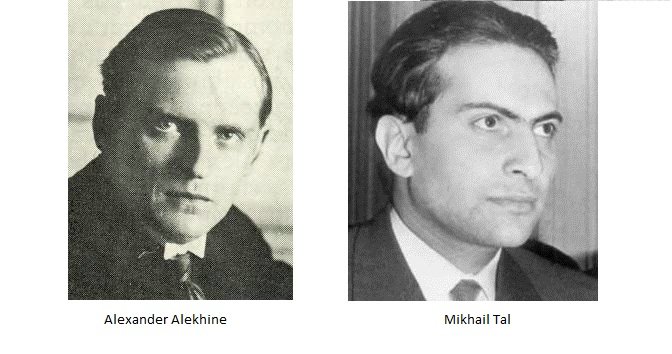
Les tentatives de reconquête (tournois interzonaux et matchs des candidats)
1962-1965 : finaliste des candidats
Après qu’il eut perdu le titre de champion du monde en 1961, Tal participa au tournoi des candidats de 1962, à Curaçao. Son état de santé l’obligea à se retirer après trois tours (21 parties). Il n’avait alors marqué que 7 points (+3 -10 =8).
Lors du cycle suivant (1964-1966), la FIDE le dispensa de disputer un tournoi zonal et le sélectionna pour le tournoi interzonal. Au tournoi interzonal d’Amsterdam, en 1964, il termina 1er-4e ex æquo avec Larsen, Spassky et Smyslov (+11 =12). En 1965, au cours des matchs des candidats, il battit Portisch (+4 -1 =3) en quart de finale, puis Larsen (+3 -2 =5) en demi-finale avant de perdre en finale contre Spassky (+1 -4 =6).
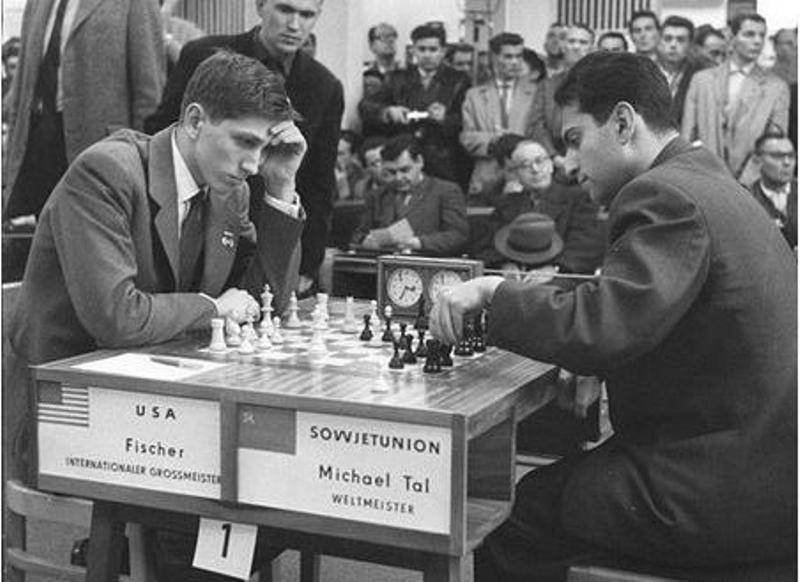
1968-1969 : demi-finaliste des candidats
Son statut de finaliste du cycle précédent lui évita de disputer le tournoi interzonal de Sousse, en 1967, et il fut directement qualifié pour les matchs des candidats. En 1968, il élimina Gligoric (+3 -1 =5) en quart de finale des candidats, mais fut battu par Kortchnoï (+1 -2 =7) en demi-finale. Puis en 1969, en prévision d’un possible désistement d’un candidat au cours du cycle suivant et afin de le pallier, il dut disputer contre Larsen un match pour la 3e place qu’il perdit (+1 -4 =3).
De graves ennuis de santé empêchèrent Tal de participer au tournoi interzonal de 1970 : lors du championnat d’URSS d’octobre 1969, qui était un tournoi zonal, Tal, qui avait retardé une opération du rein, termina 14e-15e et fut éliminé. Un mois après, en novembre 1969, Tal se faisait opérer d’un rein et commença une nouvelle phase de sa carrière.
1973-1980 : quart de finaliste des candidats
Sélectionné en 1972 grâce à son classement Elo, il fut de retour au tournoi interzonal de Leningrad en juin 1973. Encore mal rétabli après une nouvelle hospitalisation, il finit à une décevante 8e-10e place (+6 -5 =5).
Tal recouvra sa forme passée au tournoi interzonal de Bienne en 1976 avec une 2e-4e place (+6 -1 =12) qui lui permit de disputer un match-tournoi de barrage. À l’issue de celui-ci contre Petrossian (=4) et Portisch (-1 =3), il fut éliminé et ne participa pas aux matchs des candidats de 1977.
En 1979, il écrasa la concurrence au tournoi interzonal de Riga où, devant son public, il remporta la première place avec 2½ points d’avance sur le second (+11 =6). En 1980, il fut éliminé dès les quarts de finale par Polougaïevski (+0 -3 =5).
1982-1990 : quatrième du tournoi des candidats
À Moscou en 1982, l’année du début de l’ascension de Garry Kasparov qui remporta le tournoi interzonal puis le championnat du monde, Tal termina à la 3e-4e place (+4 -1 =8), manquant ainsi les deux places qualificatives pour les matchs des candidats (qui furent prises par Kasparov et Beliavski).
Au tournoi interzonal du cycle suivant, à Taxco, en 1985, il s’adjugea la 3e place (+5 =10), se qualifiant ainsi pour le tournoi des candidats de Montpellier. En novembre 1985, à Montpellier, il finit 4e-5e (+3 -1 =11) ex aequo avec Jan Timman et fut éliminé après un match de départage contre ce dernier (+1 -1 =4). Timman fut qualifié car il avait obtenu plus de victoires au cours du tournoi.
À l’interzonal de Subotica, en 1987, il finit à la 4e-5e place (+6 -1 =8) et fut éliminé. Sa défaite contre l’avant-dernier du tournoi l’empêcha de remporter la première place.
Lors de son dernier tournoi interzonal à Manille, en 1990, qui était un système suisse, il termina à la 29e-39e place avec 6,5 points sur 13.
Victoires au championnat d’URSS (1967-1979 et 1991)
Tal conquit six fois le titre de Champion d’URSS, égalant ainsi le record que Mikhail Botvinnik avait établi auparavant.
- 1957, à Moscou : +9 -2 =10
- 1958, à Riga : +10 -3 =5
- 1967, invaincu à Kharkov, système suisse à 126 participants : +7 =6 ; ex æquo avec Lev Polougaïevski
- 1972, invaincu à Bakou : +9 =12
- 1974, Leningrad : +6 -2 =7 ; ex æquo avec Alexandre Beliavski
- 1978, invaincu à Tbilissi : +5 =12 ; ex æquo avec Vitali Tsechkovski
En outre, Tal a terminé 2e-3e en 1959, 1962 et 1971 ; 3e en 1964-1965 et 2e-4e en 1975. Il participa pour la dernière fois lors du dernier championnat d’échecs d’URSS en 1991, sept mois avant sa mort.
Problèmes de santé
Mikhaïl Tal était un fumeur important et buvait souvent.
En 1959, alors qu’il participait au championnat de Moscou de blitz, deux semaines avant le tournoi des candidats, il eut une attaque, et perdit dix parties. Retourné à Riga, il fut transporté à la clinique et on lui enleva son appendice. Pendant près de deux années après l’opération, ses problèmes de rein cessèrent. À la fin du tournoi du nouvel an à Stockholm (1960-1961), quelques semaines avant le match revanche contre Botvinnik, Tal fut atteint de coliques néphrétiques, et la fédération internationale envisagea de reporter le match de championnat du monde. En 1961, après le championnat d’URSS de Bakou, les coliques recommencèrent et il se fit opérer du rein, mais les médecins ne diagnostiquèrent pas la bonne maladie. En 1962, lors du tournoi des candidats de Curaçao, il fut de nouveau hospitalisé, et dut abandonner le tournoi après 21 parties. En 1963, peu avant le match Botvinnik—Petrossian, un examen révéla qu’une opération était nécessaire ; elle réussit parfaitement. En 1964-1965, lors du championnat d’URSS, sur le conseil des médecins, il disputa des parties alité dans sa chambre d’hôtel.
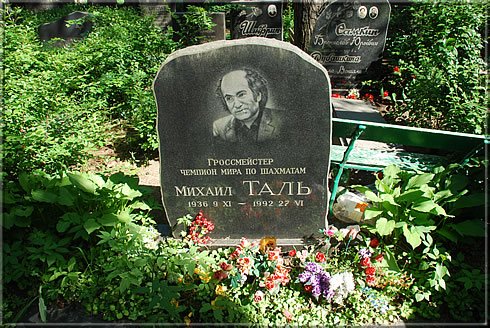
En 1969, il décida de reporter son opération du rein pour participer au championnat d’URSS de novembre, tournoi zonal qualificatif pour le championnat du monde ; il termina seulement 14e-15e. Un mois après, les médecins lui retirèrent un rein, et Tal remporta le tournoi de Tbilissi à la fin de l’année. En 1973, il fut à nouveau hospitalisé, et réalisa des contre-performances au tournoi interzonal et au championnat d’URSS. Il mourut en juin 1992, à 55 ans, d’une insuffisance rénale.
Séries d’invincibilité (1972-1982)
Si Petrossian était réputé le joueur le plus difficile à battre dans les années 1950 et 1960 (il termina six fois invaincu du championnat d’URSS), Tal remporta trois fois le championnat d’URSS sans concéder de défaite (en 1967, 1972 et 1978) et réalisa, dans les années 1970 et 1980, trois des plus longues séries d’invincibilité : entre le 15 juillet 1972 (tournoi de Viljandi en Estonie) et le 26 avril 1973 (tournoi par équipe des générations d’URSS), il joua 86 parties dans diverses compétitions sans en perdre une seule : +47 -0 =39 (74,5 %). La série se termina au tournoi des générations à Moscou, en 1973, où il perdit deux parties. Peu après, il perdit six parties au tournoi interzonal de Leningrad, puis quatre parties lors du championnat d’URSS. Après sa défaite dans la 15e ronde du championnat d’URSS, contre Petrossian en octobre 1973, il fut de nouveau invaincu pendant 93 parties (+45 =48, 74,2 %), jusqu’en octobre 1974, lorsque Nino Kirov Ivanov arrêta sa série dans la 4e ronde du tournoi de Novi Sad, que Tal remporta. En 1978 (invaincu) et jusqu’au tournoi de Montreal 1979, il réalisa une série de 79 parties avec une seule défaite (au tournoi de Tallinn). Il réalisa une dernière série de 80 parties sans défaite en 1981-1982 (invaincu en 1981) : +35 =45 (70,1 %).
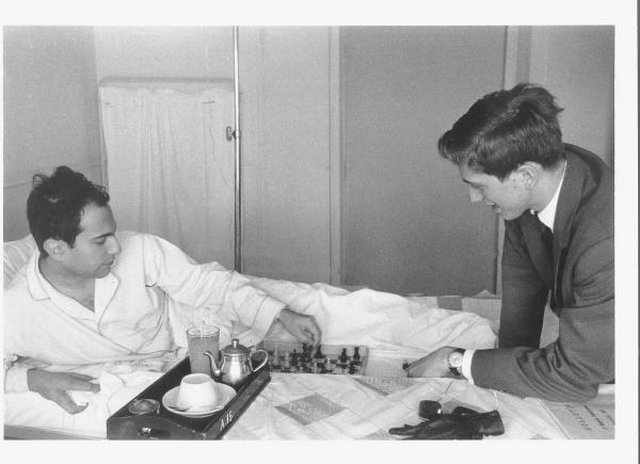
Palmarès
Tal participait à de nombreux tournois. Il disait que pour exercer son talent combinatoire, il avait besoin de disputer plus de cent parties par an. Dans toute sa carrière, il remporta plus de quarante tournois internationaux, seul ou ex aequo :
1952 – 1960 : champion d’URSS et champion du monde
Pendant six ans, de 1949 à 1954, Tal participa au championnat d’URSS junior par équipes : à Moscou (en 1949 et 1950), à Léningrad (en 1951, 4e échiquier), à Rostov (en 1952), à Kharkov (en 1953) et à Léningrad, en 1954, au premier échiquier, où il termina deuxième. En 1950, Tal remporta le championnat de Riga junior. En 1950-1951, il termina 11e-14e du championnat de Riga adulte (9 points sur 19, après avoir marqué 12,5 points sur 13 lors du quart de finale), puis 11e-14e de la finale du championnat de Lettonie 1951 à Riga en marquant à nouveau 9 points sur 19. En 1952, il participa à nouveau au championnat de Lettonie à Riga. En 1954, il termina 9e-10e au premier échiquier de l’équipe du club de Riga lors du championnat d’URSS par équipes de clubs disputé à Riga avec 4 points sur 10 (+1 –3 =6), tournoi toutes rondes remporté par Petrossian devant Aronine, Taïmanov, Kortchnoï et Averbakh.
1961 – 1967 : ancien champion du monde
En 1962, Tal, malade, se retira du tournoi des candidats de Curaçao après 21 rondes sur 28 et 7 points marqués sur 21.
1968 – 1974 : après l’opération du rein
En 1968-1969, demi-finaliste lors du tournoi des candidats, Tal perdit ses matchs contre Kortchnoï et contre Larsen (match pour la troisième place) et finit quatrième. Lors du championnat d’URSS disputé à Moscou en octobre 1969, qui était un tournoi zonal, Tal termina 14e-15e en marquant à nouveau moins de la moitié des points (10,5 / 22). En 1972, pendant le tournoi de Vilandji, Tal commença sa première série d’invincibilité qui dura un an. En 1973, pendant le championnat d’URSS, puis le tournoi de Doubna, Tal commença une deuxième série d’invincibilité terminée lors du tournoi de Novi-Sad (1974).
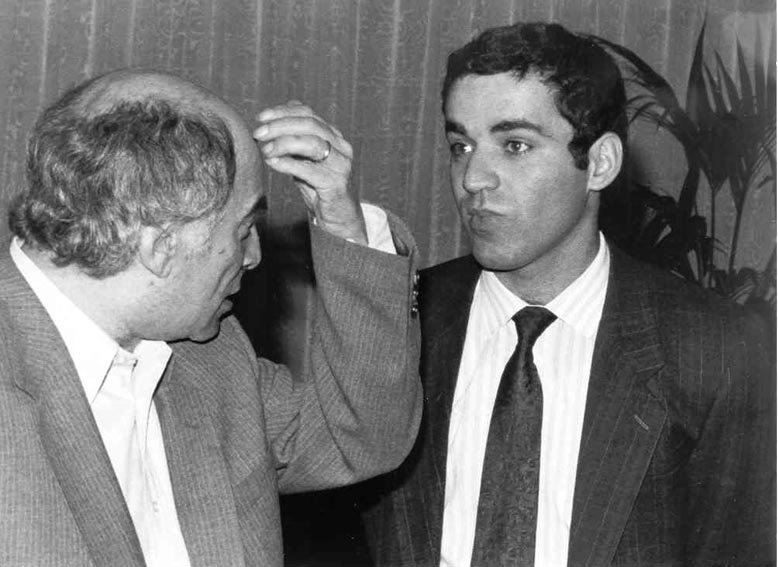
1975 – 1982
En 1975, Tal participa à la préparation de Karpov pour le match Karpov-Fischer qui n’eut finalement pas lieu. En 1978, il le seconda pour le match de Baguio contre Kortchnoï et fut invaincu dans ses propres parties. En 1979, dix ans après le tournoi zonal de 1969, il termina à nouveau 14e-15e du championnat d’URSS.
En 1980, Tal perdit son match des candidats contre Lev Polougaïevski, termina l’olympiade de Malte en ayant perdu une partie contre Seirawan : 3,5 / 6 (+2 –1 =3) et perdit un mini-match contre Kasparov à Bakou (+0 –1 =1). En 1981, Tal remporta toutes les compétitions auxquelles il participa et il commença une nouvelle série d’invincibilité de 80 parties, qui dura jusqu’en 1982.
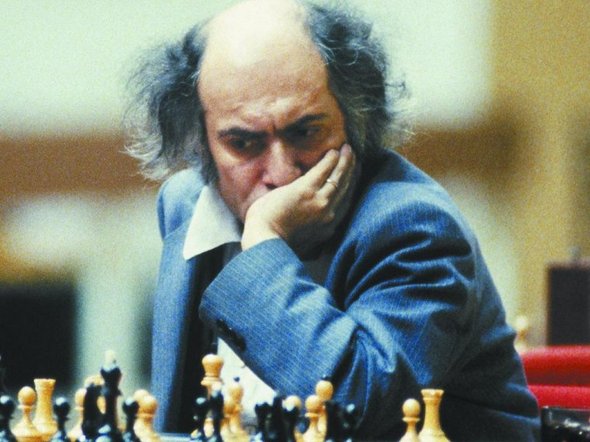
1983 – 1992 : dernières années
À partir de 1985, avec la perestroika, Tal put plus facilement participer à des tournois à l’étranger.
En 1988, il termina 10e-13e du tournoi de Bruxelles (+3 –4 =9) ; puis, en 1989, 10e-12e du tournoi de Skelleftea (+0 –1 =14), ces tournois comptant pour la coupe du monde GMA.
En 1990, il finit 24e-34e (+0 –1 =10) de l’open GMA de Moscou, puis 29e-39e de l’interzonal de Manille (+3 –3 =7) ; puis en 1991, 34e-49e du dernier championnat d’URSS à Moscou (+1 –2 =8).
Championnats d’URSS
De 1956 à 1979, Tal a participé à 19 éditions du championnat d’URSS sur 25 possibles. Il n’a été absent que six fois : en 1960 et février 1961, car il devait disputer ses deux matchs de championnats du monde contre Botvinnik ; en décembre 1963, car il participait au tournoi de noël à Hastings ; en novembre-décembre 1965, car le match de la finale des candidats contre Boris Spassky se terminait après le début du championnat ; en 1966-1967, car la finale était un tournoi zonal qui sélectionnait les joueurs soviétiques qui disputeraient l’interzonal de Sousse, en Tunisie, et Tal, non concerné, ne voulut pas influencer le résultat du tournoi ; et en 1970, à Riga où Tal fut remplacé comme joueur hôte du tournoi par Gipslis, car, du fait de sa récente opération d’ablation d’un rein, les sélectionneurs devaient penser qu’il ne terminerait pas le tournoi.
Olympiades (1958 – 1982)
A partir de 1958, Tal fut une des valeurs sûres de l’URSS qu’il représenta à huit reprises. L’URSS remporta à chaque fois la médaille d’or. Il a le meilleur pourcentage parmi les joueurs ayant participé à au moins 4 olympiades : 82 / 101 (+65 -2 =34).
- 1958, à Munich – 1er remplaçant : 13,5 / 15 (+12 =3) – Médaille d’or, meilleure performance absolue en pourcentage (tous échiquiers confondus)
- 1960, à Leipzig – 1er échiquier : 11 / 15 (+8 -1 =6) – Médaille d’argent
- 1962, à Varna – 2e remplaçant : 10 / 13 (+7 =6) – Médaille d’or
En 1964, Tal fut remplacé par Boris Spassky.
- 1966, à La Havane – 3e échiquier : 12 / 13 (+11 =2) – Médaille d’or, meilleure performance absolue (tous échiquiers confondus)
En 1968, Tal fut remplacé à la dernière minute par Vassily Smyslov.
- 1972, à Skopje – 4e échiquier : 14 / 16 (+12 =4) – Médaille d’or, meilleure performance absolue (tous échiquiers confondus)
- 1974, à Nice – 1er remplaçant : 11,5 / 15 (+8 =7) – Médaille d’or
En 1976, l’URSS boycotta l’olympiade de Haïfa. En 1978, Tal, qui avait aidé Karpov pour son championnat du monde, ne fut pas sélectionné dans l’équipe soviétique qui perdit le titre à Buenos Aires.
- 1980, à La Valette – 3e échiquier : 3,5 / 6 (+2 -1 =3)
- 1982, à Lucerne – 1er remplaçant : 6,5 / 8 (+5 =3) – Médaille d’argent
Matchs URSS contre le Reste du monde (1970 et 1984)
Lors de la première rencontre à Belgrade, en 1970, il fut opposé à Miguel Najdorf au neuvième échiquier. Leur match individuel se solda par une égalité +1 -1 =2.
En 1984, à Londres, il joua trois parties au septième échiquier : deux parties contre John Nunn qu’il domina (+1 =1) et une contre Murray Chandler (=1).
Autres compétitions par équipes
Olympiades universitaires (1956 – 1958) :
Dans sa jeunesse, Tal participa à trois éditions de cette compétition. L’URSS remporta la médaille d’or à chaque fois.
- 1956 – Uppsala : 3e échiquier (+5 =2) – Médaille d’or
- 1957 – Reykjavik : 1er échiquier (+7 =3) – Médaille d’or
- 1958 – Varna : 1er échiquier (+7 =3) – Médaille d’or
- Championnats d’Europe par équipes.
A chacune de ses participations, l’URSS sortit vainqueur de cette compétition.
- 1957 Vienne – 4e échiquier (+2 -1 =2) – Médaille d’or
- 1961 Oberhausen – 2e échiquier (+3 -1 =5)
- 1970 Kapfenberg – 7e échiquier (+4 =2) – Médaille d’or
- 1973 Bath – 5e échiquier (+2 =4)
- 1977 Moscou – 4e échiquier (+3 =3) – Médaille d’or
- 1980 Skara – 2e échiquier (-1 =4)
Divers
De 1960 à 1970, il fut le rédacteur en chef de la revue d’échecs lettone Šahs.
En 1988, il conquit le titre officieux de champion du monde de blitz en devançant, entre autres, Garry Kasparov et Anatoli Karpov.
Il souffrait d’une malformation congénitale qui ne lui laissait que trois doigts à la main droite.
Trois parties de Tal
Boris Spassky – Tal, Tallinn, 1973 (voir cette partie sur Informateur (parties du premier semestre 1973).
1. d4 Cf6 2. c4 e6 3. Cc3 Fb4 4. Fg5 h6 5. Fh4 c5 6. d5 b5 7. dxe6 fxe6 8. cxb5 d5 9. e3 O-O 10. Cf3 Da5 11. Fxf6 Txf6 12. Dd2 a6 13. bxa6 Cc6 14. Fe2 d4 15. exd4 Txf3 16. Fxf3 cxd4 17. O-O dxc3 18. bxc3 Fxc3 19. Dd6 Txa6 20. Fxc6 Fb4 21. Db8 Txc6 22. Tac1 Fc5 23. Tc2 Da4 24. Db3 Df4 25. Dg3 Df5 26. Tfc1 Fb7 27. Df3 Dg5 28. Db3 Tc7 29. g3 Fxf2+ 30. Rxf2 Df6+ 31. Re1 De5+ 32. Rf1 Fa6+ 33. Rg1 Dd4+ 34. Rg2 De4+ 35. Rg1 Fb7 36. h4 Dh1+ 37. Rf2 Tf7+ 38. Re2 De4+ Abandon 0-1 (la dame est perdue dans toutes les variantes : 39. De3 Fa6+ 40. Rd2 Td7)
Tal – Wolfgang Uhlmann, Herceg Novi (tournoi blitz, 1970 : 1.g3 d5 2.Fg2 Cf6 3.c4 dxc4 4.Cf3 Cbd7 5.0-0 a6 6.Ca3 c5 7.Cxc4 e6 8.d4 Tb8 9.Ff4 Ta8 10.dxc5 Cxc5 11.Dxd8+ Rxd8 12.Tfd1 Cfd7 13.Cb6 Ta7 14.Fb8 1 – 0
Svetozar Gligoric – Tal, tournoi des candidats 1959, Belgrade :
1. d4 Cf6 2. c4 c5 3. d5 e6 4. Cc3 exd5 5. cxd5 d6 6. e4 g6 7. Cf3 Fg7 8. Fe2 0-0 9. 0-0 Te8 10. Cd2 Ca6 11. Tb1 Fd7 12. Te1 Tb8 13. b3 b5 14. Fb2 Cc7 15. Dc2 De7 16. Cd1 Fh6 17. f3 Ch5 18. Cf1 Cxd5! 49 19. exd5 Ff5 20. Dc3 Fg7 21. Dc1 Fxb1 22. Fxg7 Rxg7 23. Dxb1 Cf4 24. Cde3 De5 25. Fxb5! Txb5 26. Cf5+ gxf5!? Gligoric a écrit: « Typique de Tal. Les Noirs disposaient d’une suite plus sûre et objectivement meilleure par 26…Dxf5 27. Dxf5 gxf5 28. Txe8 Cxd5, où les Blancs auraient dû lutter pour récupérer leur pion et obtenir la nulle – ce qu’ils auraient pu obtenir par 29. Td8 Tb6 30. Cd2 (menaçant 31. Cc4). Mais Tal a parié sur la sévère crise de temps de son adversaire et choisi une suite à double tranchant où les Blancs n’avaient pas de plan clair à leur disposition ». La suite de la partie a été marquée par des erreurs de part et d’autres dues au zeitnot: 27. Txe5 Txe5 28. g3 Ce2+ 29. Rf2 Rg8? 30. Ce3? Cd4 31. f4 Te4 32. g4?? Txf4+ 33. Rg2 fxg4 34. Cc4 Cf3 35. Dc1 Tf6 36. De3 Rf8 37. De4 Tb8 38. Dxh7 Te8! 39. Dh8+ Re7 40. Dg7 Ch4+ 41. Rg1 Cf3+ 42. Rg2 Tg6 43. Dc3 Cd4 44. b4 Rf8 45. Ce3 g3! 46. h3 Tf6 0 – 1
Citations
- Je bois, je fume et je cours les filles, mais le jeu par correspondance est un des vices que je n’ai pas.
- Alors qu’on lui demandait comment il pouvait laisser autant de pièces en prise, il répondit : Il ne peut en prendre qu’une à la fois !
[/lang_fr]
[lang_en]
Mikhail Tal
| Mikhail Tal | |
|---|---|
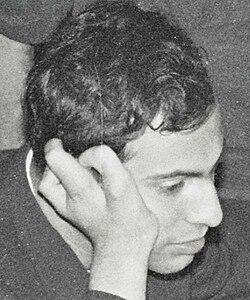 |
|
| Full name | Latvian: Mihails Tals Russian: Mikhail Nekhemievich Tal |
| Country | |
| Born | November 9, 1936 Riga, Latvia |
| Died | June 28, 1992 [1] (aged 55) Moscow, Russia |
| Title | Grandmaster (1957) |
| World Champion | 1960–1961 |
| Peak rating | 2705 (January 1980) |
Mikhail Tal ( Latvian: Mihails Tals), Michail Nechem’evic Tal, sometimes transliterated Mihails Tals or Mihail Tal; November 9, 1936 – June 28, 1992) [1] was a Soviet– Latvian chess player, a Grandmaster, and the eighth World Chess Champion.
He was often called « Misha », a diminutive for Mikhail, and « The magician from Riga » for his daring combinatorial style. Both The Mammoth Book of the World’s Greatest Chess Games ( Burgess, Nunn & Emms 2004) and Modern Chess Brilliancies ( Evans 1970) include more games by Tal than any other player. Tal was also a highly-regarded chess writer; his professional career was that of a chess journalist.
The Mikhail Tal Memorial is held in Moscow each year since 2006 to honour his memory.
He holds the records for both the first and second longest unbeaten streaks in competitive chess history. [2] Many authorities consider him to have been the greatest attacking Grandmaster of all time. [3]
Contents |
Early years
[Top page]
Tal was born in Riga, Latvia, into a Jewish family. At the age of eight, Tal learned to play chess while watching his father, a doctor. Shortly thereafter he joined the Riga Palace of Young Pioneers chess club. His play was not exceptional at first but he worked hard to improve. Alexander Koblents began tutoring Tal in 1949, after which Tal’s game rapidly improved, and by 1951 he had qualified for the Latvian Championship. In the 1952 Latvian Championship Tal finished ahead of his trainer. Tal won his first Latvian title in 1953, and was awarded the title of Candidate Master. He became a Soviet Master in 1954 by defeating Vladimir Saigin in a qualifying match. That same year he also scored his first win over a Grandmaster when Yuri Averbakh lost on time in a drawn position. Tal graduated in Literature from the University of Riga, writing a thesis on the satirical works of Ilf and Petrov, and taught school in Riga for a time in his early twenties. He was a member of the Daugava Sports Society, and represented Latvia in internal Soviet team competitions.
Soviet champion
[Top page]
Tal first qualified for the USSR Chess Championship final in 1956, finishing joint fifth, and became the youngest player to win it the following year, at the age of 20. He had not played in enough international tournaments to qualify for the title of Grandmaster, but FIDE decided at its 1957 Congress to waive the normal restrictions and award him the title because of his achievement in winning the Soviet Championship. [4]
Tal made three appearances for the USSR at Student Olympiads, from 1956–1958, winning three team gold medals and three board gold medals. He won nineteen games, drew eight, and lost none, for 85.2 percent. [5]
He retained the Soviet Championship title in 1958 at Riga, and competed in the World Chess Championship for the first time. He won the 1958 Interzonal tournament at Portorož, then helped the Soviet Union win their fourth consecutive Chess Olympiad at Munich.
World champion

Tal and Botvinnik, 1960 match
Tal won a very strong tournament at Zürich, 1959. Following the Interzonal, the top players carried on to the Candidates’ Tournament, Yugoslavia 1959. Tal showed superior form by winning with 20/28 points, ahead of Paul Keres with 18½, followed by Tigran Petrosian, Vasily Smyslov, Bobby Fischer, Svetozar Gligoric, Friðrik Ólafsson, and Pal Benko. Tal’s victory was attributed to his dominance over the lower half of the field; [6] whilst scoring only one win and three losses versus Keres, he won all four individual games against Fischer, and took 3½ points out of 4 from each of Gligoric, Olafsson, and Benko. [7]
In 1960, at the age of 23, Tal thoroughly defeated the relatively staid and strategic Mikhail Botvinnik in a World Championship match, held in Moscow, by 12½–8½ (six wins, two losses, and thirteen draws), making him the youngest-ever world champion (a record later broken by Garry Kasparov, who earned the title at 22). Botvinnik, who had never faced Tal before the title match began, won the return match against Tal in 1961, also held in Moscow, by 13–8 (ten wins to five, with six draws). In the period between the matches Botvinnik had thoroughly analyzed Tal’s style, and turned most of the return match’s games into slow wars of maneuver or endgames, rather than the complicated tactical melees which were Tal’s happy hunting ground. [8] Tal’s chronic kidney problems contributed to his defeat, and his doctors in Riga advised that he should postpone the match for health reasons. Yuri Averbakh claimed that Botvinnik would agree to a postponement only if Tal was certified unfit by Moscow doctors, and that Tal then decided to play. [9] His short reign atop the chess world made him one of the two so-called » winter kings » who interrupted Botvinnik’s long reign from 1948 to 1963 (the other was Smyslov, world champion 1957–1958).
His highest Elo rating was 2705, achieved in 1980. His highest Historical Chessmetrics Rating was 2799, in September 1960. This capped his torrid stretch which had begun in early 1957.
Later achievements

Mikhail Tal, 1971
Soon after losing the rematch with Botvinnik, Tal won the 1961 Bled supertournament by one point over Fischer, despite losing their individual game, scoring 14½ from nineteen games (+11 -1 =7) with the world-class players Tigran Petrosian, Keres, Gligoric, Efim Geller, and Miguel Najdorf among the other participants.
Tal played in a total of six Candidates’ Tournaments and match cycles, though he never again earned the right to play for the world title. In 1962 at Curaçao, he had serious health problems, having undergone a major operation shortly before the tournament, and had to withdraw three-quarters of the way through, scoring just seven points (+3 -10 =8) from 21 games. He tied for first place at the 1964 Amsterdam Interzonal to advance to matches. Then in 1965, he lost the final match against Boris Spassky, after defeating Lajos Portisch and Bent Larsen in matches. Exempt from the 1967 Interzonal, he lost a 1968 semi-final match against Viktor Korchnoi, after defeating Gligoric.
Poor health caused a slump in his play from late 1968 to late 1969, but he recovered his form after having a kidney removed. He won the 1979 Riga Interzonal with an undefeated score of 14/17, but the next year lost a quarter-final match to Lev Polugaevsky, one of the players to hold a positive score against him. He also played in the 1985 Montpellier Candidates’ Tournament, a round-robin of 16 qualifiers, finishing in a tie for fourth and fifth places, and narrowly missing further advancement after drawing a playoff match with Jan Timman, who held the tiebreak advantage from the tournament proper.
From July 1972 to April 1973, Tal played a record 86 consecutive games without a loss (47 wins and 39 draws). Between October 23, 1973 and October 16, 1974, he played 95 consecutive games without a loss (46 wins and 49 draws), shattering his previous record. These are the two longest unbeaten streaks in modern chess history. [2]
A measure of Tal’s strength also in his later years is given by his score against Anatoly Karpov, who was some 15 years younger, in tournament games: one loss (at Bugojno, 1980) and nineteen draws out of 20 games they played.
One of Tal’s greatest achievements during his later career was an equal first place with Karpov (whom he seconded in a number of tournaments and world championships) in the 1979 Montreal « Tournament of Stars », with an unbeaten score of (+6 =12), the only undefeated player in the field, which also included Spassky, Portisch, Vlastimil Hort, Robert Hübner, Ljubomir Ljubojevic, Lubomir Kavalek, Timman and Larsen.
Tal played in 21 Soviet Championships, [10] winning it a record six times (1957, 1958, 1967, 1972, 1974, 1978), a number only equalled by Botvinnik. He was also a five-time winner of the International Chess Tournament in Tallinn, Estonia, with victories in 1971, 1973, 1977, 1981, and 1983.
Tal also had successes in blitz chess; in 1970, he took second place to Fischer, who scored 19/22, in a blitz tournament at Herceg Novi, Yugoslavia, ahead of Korchnoi, Petrosian and Smyslov. In 1988, aged 51, he won the second official World Blitz Championship (the first was won by Kasparov the previous year in Brussels) at Saint John, ahead of such players as Kasparov, the reigning world champion, and ex-champion Anatoly Karpov. In the final, he defeated Rafael Vaganian by 3½-½.
Team competitions
[Top page]
In Olympiad play, Mikhail Tal was a member of eight Soviet teams, each of which won team gold medals ( 1958, 1960, 1962, 1966, 1972, 1974, 1980, and 1982), won sixty-five games, drew thirty-four, and lost only two games (81.2 percent). This percentage makes him the player with the best score among those participating in at least four Olympiads. Individually, Tal won seven Olympiad board medals, including five gold (1958, 1962, 1966, 1972, 1974), and two silver (1960, 1982). [5]
Tal also represented the Soviet Union at six European Team Championships (1957, 1961, 1970, 1973, 1977, 1980), winning team gold medals each time, and three board gold medals (1957, 1970, and 1977). He scored 14 wins, 20 draws, and three losses, for 64.9 percent. [5] Tal played board nine for the USSR in the first match against the Rest of the World team at Belgrade 1970, scoring 2 out of 4. He was on board seven for the USSR in the second match against the Rest of the World team at London 1984, scoring 2 out of 3. The USSR won both team matches. He was an Honoured Master of Sport. [11]
From 1950 (when he won the Latvian junior championship) to 1991, Tal won or tied for first in 68 tournaments (see table below). During his 41-year career he played about 2,700 tournament or match games, scoring over 65 percent.
Score with some major Grandmasters
[Top page]
Only official tournament or match games have been taken into account. ‘+’ corresponds to Tal’s wins, ‘-‘ to his losses and ‘=’ to draws.
Health problems
[Top page]
Tal suffered from bad health, and had to be hospitalized frequently throughout his career, mainly for kidney problems. Eventually one of his diseased kidneys was removed. Tal was a chain smoker and a heavy drinker. [12] He was also briefly addicted to morphine. [13] On June 28, 1992, [1] Tal died in a Moscow hospital, officially of kidney failure. But his friend and fellow Soviet grandmaster Genna Sosonko reported that « in reality, all his organs had stopped functioning. » [14][ not in citation given] Tal had the congenital deformity of ectrodactyly in his right hand (visible in some photographs).
Playing style

Tal’s gravestone, showing a death date of « 1992 27 VI » (June 27, 1992)
Tal loved the game in itself and considered that « Chess, first of all, is Art. » He was known to play numerous blitz games against unknown or relatively weak players purely for the joy of playing.
Known as « The Magician from Riga », Tal was the archetype of the attacking player, developing an extremely powerful and imaginative style of play. His approach over the board was very pragmatic – in that respect, he is one of the heirs of ex-World Champion Emanuel Lasker. He often sacrificed material in search of the initiative, which is defined by the ability to make threats to which the opponent must respond. With such intuitive sacrifices, he created vast complications, and many masters found it impossible to solve all the problems he created over the board, though deeper post-game analysis found flaws in some of his conceptions. The famous sixth game of his first world championship match with Botvinnik is typical in that regard: Tal sacrificed a knight with little compensation but prevailed when the unsettled Botvinnik failed to find the correct response.
Although his playing style was scorned by ex-World Champion Vasily Smyslov as nothing more than « tricks », Tal convincingly beat virtually every notable grandmaster with his trademark aggression. Viktor Korchnoi and Paul Keres are two of the very few with a significant plus record against him. It is also notable that he adopted a more sedate and positional style in his later years; for many chess lovers, the apex of Tal’s style corresponds with the period (approximately from 1971 to 1979) when he was able to integrate the solidity of classical chess with the imagination of his youth. [15]
Of the current top-level players, the Latvian-born Spaniard Alexei Shirov has probably been most influenced or inspired by Tal’s sacrificial style. In fact, he studied with Tal as a youth. Many other Latvian grandmasters and masters, for instance Alexander Shabalov and Alvis Vitolins, have played in a similar vein, causing some to speak of a « Latvian School of Chess. » [16] Tal contributed little to opening theory, despite a deep knowledge of most systems, the Sicilian and the Ruy Lopez in particular. But his aggressive use of the Modern Benoni Defense, particularly in his early years, led to a complete re-evaluation of this variation at the time, though it is seldom seen in top-class tournament play in the 21st century.
Quotations on chess
- « There are two kinds of sacrifices: sound ones, and mine. » [17]
- « To play for a draw, at any rate with White, is to some degree a crime against chess. » [18]
- « If Black is going for victory, he is practically forced to allow his opponent to get some kind of well-known positional advantage. »
- « It is also important to remember that Bobby Fischer was a real chess gentleman during games. He was always very fair and very correct. »
- « I drink, I smoke, I gamble, I chase girls – but postal chess is one vice I don’t have. » [19]
- « They compare me to Lasker, which is an exaggerated honor. He made mistakes in every game and I only in every second one! »
- Nevertheless, when asked about his opinion on who was the greatest player of all time, he answered: « Lasker, for he made miracles on the chessboard. »
- Referring to his piece sacrifices: « They can only take them one at a time! »
- « If playing chess were made illegal by law, I would become an outlaw. »
- « You must take your opponent into a deep dark forest where 2+2=5, and the path leading out is only wide enough for one. »
[/lang_en]
